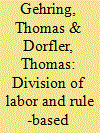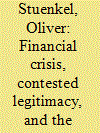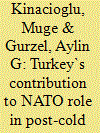|
|
|
Sort Order |
|
|
|
Items / Page
|
|
|
|
|
|
|
| Srl | Item |
| 1 |
ID:
125383


|
|
|
|
|
| Publication |
2013.
|
| Summary/Abstract |
Decisionmaking within the Security Council increasingly involves delegation to subsidiary bodies. Drawing on modern institutional theory, this article examines the effects of the emergent system of divided labor within the al-Qaeda/Taiwan sanction regime. The article first looks at the political economy of the process of listing individuals and private entities as sanctions targets. Second, it explores the distinct functions performed by the bodies of the sanctions regime; namely, the Security Council, the AQT Sanctions Committee, the Office of the Ombudsperson, and an expert body. Third, it analyzes the resulting incentive structures in three successive stage of regime development. The article concludes that the sanctions regime constitutes a surprisingly well-advanced model of how to commit even powerful states to rule based governance without depriving them of their capability to adopt political decision.
|
|
|
|
|
|
|
|
|
|
|
|
|
|
|
|
| 2 |
ID:
125380


|
|
|
|
|
| Publication |
2013.
|
| Summary/Abstract |
This article examines the source and consequences of East Asia`s participation in global governance. Despite the rhetoric of global contribution, the article argues that global governance issues are reframed in East Asia to better suit domestic and regional priorities. Specially, two underlying mechanisms are at work to complicate, and often render ineffective, East Asia`s foray into global governance: (1) the conflicting identities of the three countries at the regional and global levels; and (2) the localization of global governance issues. By examining the global role of China, Japan, and South Korea in Climate change, peacekeeping and nuclear nonproliferation, the article shows how the shared desire of enhancing global status in East Asia is tempered by the politics of dual identity and issue localization.
|
|
|
|
|
|
|
|
|
|
|
|
|
|
|
|
| 3 |
ID:
125440


|
|
|
|
|
| Publication |
2013.
|
| Summary/Abstract |
The rise of the BRIC grouping (Brazil, Russia, India, China) is one of the most commented on phenomena in international politics of the past year. Yet little is known about how and why institutionalized cooperation between the BRIC countries began. This article makes two arguments. First, an unprecedented combination in 2008- a profound financial crisis among developed countries, paired with relative economic stability among emerging powers- caused a legitimacy crisis of the international financial order, which led to equally unprecedented cooperation between emerging powers in the context of the BRIC grouping. The BRIC countries were able to use their temporarily increased bargaining power to become agenda setters at the time -culminating in the international Monetary Fund quota reform agreed on in 2010. This shows that even short periods of reduced legitimacy in global governance can quickly lead to the rice of alternative institution - such as, in the case of the crisis that began in 2008, the BRIC platform- which now forms part of the landscape of global governance . Second, intra-BRIC cooperation in the area of international finance enhanced trust among the BRIC countries and led to a broader type of cooperation in many other areas, suggesting the occurrence of spillover effects. Intra-BRICS cooperation (Brazil, Russia, India, China, South Africa) is therefore likely to continue, even after the condition that facilitated its genesis- the crisis in the West- have disappeared.
|
|
|
|
|
|
|
|
|
|
|
|
|
|
|
|
| 4 |
ID:
125378


|
|
|
|
|
| Publication |
2013.
|
| Summary/Abstract |
The literature has generally not grappled with complex decision making structure within organizations like the UN. Special representative of the secretary- General can act as norm arbitrators in the UN System generating new practice by weighing against each other the conflicting norms that guide peacekeeping. Practices from the field, crystallized through the actions of SRSGs, Constitute a bottom-up source of influence on UN norm change processes. SRSGs enjoy relative independence and physical distance from UN headquarters. With background often from diplomatic careers, plus relative autonomy and interpretations of the UN, They can wield influence thank to a certain level of decentralized authority and their personal prestige.
|
|
|
|
|
|
|
|
|
|
|
|
|
|
|
|
| 5 |
ID:
125406


|
|
|
|
|
| Publication |
2013.
|
| Summary/Abstract |
After the Cold War, NATO formulated its role new role on the basis of broader political aims and new security objective by assuming crisis management operations beyond its borders. This article argues from a constructivist perspective that keen Turkish involvement in NATO out of area operations constitutes a context of social interaction that has led to particular identities and certain security policy outputs for both. Turkey`s participation in NATO`s military operations as the sole Muslim ally, in the post-cold war era, enabled NATO to build an identity as a global security actor in crisis management while turkey`s active role in these operations served to keep Turkey`s sense of prominence in the protection of the universal values and, thus, its claim to western identity.
|
|
|
|
|
|
|
|
|
|
|
|
|
|
|
|
|
|
|
|
|